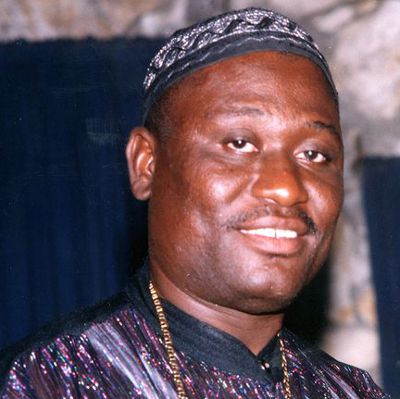Traditional Haitian music, made up for the most part from the African heritage, is especially present in rural areas, where it is performed by amateur musicians grouped around Voodoo temples. Nevertheless, for a few years, carried by the rasin movement, which advocates a return to the African side of Haitian roots, it has also been present on stage thanks to professional groups, the most popular of which is undoubtedly the group “Racine Mapou de Azor” .
The group “Racine Mapou de Azor” is led by Lénord Fortuné “Azor”, singer and drummer who belonged to numerous formations, of konpa (including SS One and Scorpio) or folklore (troupe Bakoulou), before being part of the group “Racine Kanga de Wawa”. In the 90s, led by the rasin movement, this group, led by Jacques Maurice Fortéré, “Wawa” set out to play voodoo music in concert: with him, it went directly from the hounfort (voodoo temple) to the stage. It then began to emerge from its marginalization and to be heard openly throughout the country, benefiting in particular from modern means of dissemination (disc, radio, television). It may have gained recognition in this way: Rasin bands now take part in the Port-au-Prince Carnival where they parade proudly as an integral part of the Haitian music scene. The success met by the group “Racine Mapou de Azor” therefore means, in part, the normalization of voodoo, through its music, its recognition as a culture, and the acceptance on the African and peasant side of the Haitian identity.
With this in mind, the members of the group, who all recognize that they are practicing vodouisants, explicitly subscribe to the vodou tradition and symbolic universe, to which the name of the group refers. They aspire to maintain contact with the roots of tradition and the sacred, like the mapou, sacred voodoo tree with imposing roots, reputed to harbor spirits.
Musically, with songs and percussion, bass drums and congas, the group “Racine Mapou de Azor” interprets traditional music or pure rasin, that is to say without modern arrangements or electric instruments (while the other trend of music rasin gladly adopts the rhythms of rock and their instrumentation). Marked by the tireless beat of petro-inspired drums – barely supported by a rhythm machine, the powerful voice of Azor, with the characteristic timbre of voodoo priests, seconded by a choir of women, celebrates the voodoo loas, sings l attachment to the roots or comments on episodes of political life and other artistic quarrels.
After fourteen years of existence, seven recorded discs, several tours abroad (including nine trips to Japan) and a documentary film (Haiti, beating heart of Carl Lafontant), the group “Racine Mapou de Azor” succeeds the bet of preserve the authenticity of traditional music, while using modern means of dissemination, which allow it to be included on the professional music scene in Haiti, and to compete with the music that usually occupies the news.

